Why You Should See Thaipusam Singapore
Warning: the following post contains images that some people might find disturbing. Our aims to share the seriousness of the Hindu Thaipusam Singapore Ceremony.
Thaipusam Singapore Our Experience
I had heard the stories about the Hindu Thaipusam Singapore. A frenetic Hindu ceremony where devotees carry huge kavadi. And, they have their backs, chests and cheeks pierced. A gruesome spectacle. So I was told. But, I wanted to see the actual Thaipusam Singapore, not be influenced by the stories of others.
I am really glad that I went. The Singapore Thaipusam that I observed was a serious and meaningful spiritual ceremony. The video below conveys some of the experience.
What struck me about Thaipusam Singapore was the preparation, teamwork and community. Preparations start months ahead, maybe even a lifetime ahead of the day. The devotees mostly traveled in groups. And, the men that carried the kavadis were surrounded by a team from start to finish. It was clearly a group effort. The community at the Temples was joyous, serious, and welcoming.
I came away from Thaipusam with a much deeper understanding and respect for the Hindu community and the devotees that participate in Hindu Thiapusam Singapore.
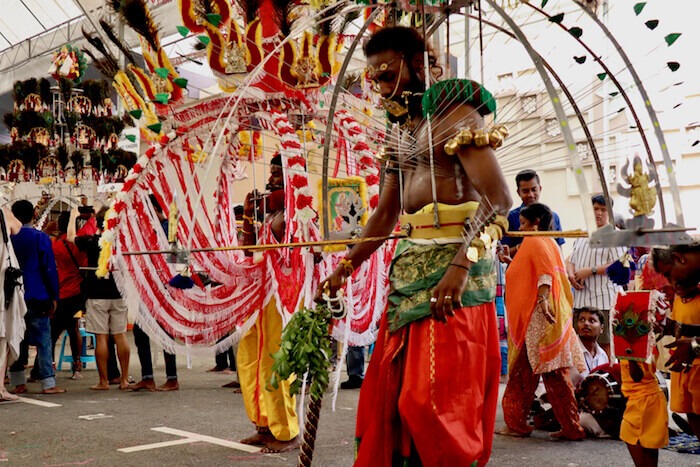
Beginning at Sri Srinivasa Perumal Temple
We watched the preparations at Sri Srinivasa Perumal Temple. It was a scene with music and praying, offerings and much excitement. There were many tourists in the Temple. I was very surprised that they welcomed non-Hindus into the Temple. After we left the Temple, we walked the 4.5 KM route and ended up at the Sri Thendayuthapani Temple.
We saw men and women, old, young and in between, show incredible strength, calmness, spirituality and dignity as they paid respect to Lord Murugan. And, the openness with which they allowed people like Reggie and me into the Temple at the beginning and end was surprising. They seemed to welcome us into the experience, though I am sure that this was not a unanimous feeling.
Read our Singapore Itinerary 4 Day for more to do on your trip to Singapore.
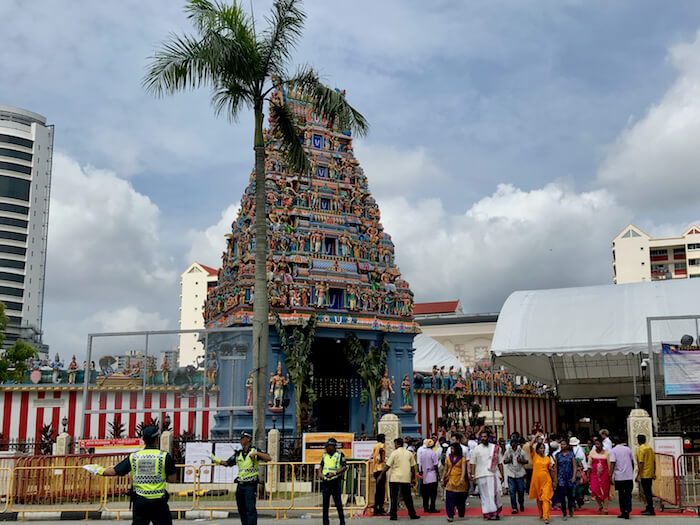
Religious Diversity in Singapore
Singapore is very religiously diverse. There are 30 main Hindu Temples, more than 40 mosques, 30 Buddhist Temples, Taoist and other Chinese Temples, too many churches to count and 2 synagogues. In 2015, the religious make-up of Singapore was:
- Buddhists 33%
- Christians 19%
- Muslims 14%
- Taoism, Confucianism, and others 11%
- Hindus 5%
Hindus in Singapore date back to the 7th century. However, the majority were brought by the British in the early 1900s. In addition, there is a significant Hindu and Indian expat community in Singapore.
What is Thaipusam?
Thaipusam is a Tamil Hindu religious ceremony and tribute to the son of Shiva and the God of War, Lord Murugan (also known as Lord Subramaniam). It takes place on the date of his vanquishing of the demon Soorapadman. The date is determined by the Hindu lunar calendar, so varies year to year. After Lord Murugan vanquished the demon, he appeared mounted on a peacock with a golden spear (or vel).
In addition to battling evil, Lord Murugan is believed to grant favors. As a result, Thaipusam is a day of prayer, penance, thanksgiving and offerings to Lord Murugan.
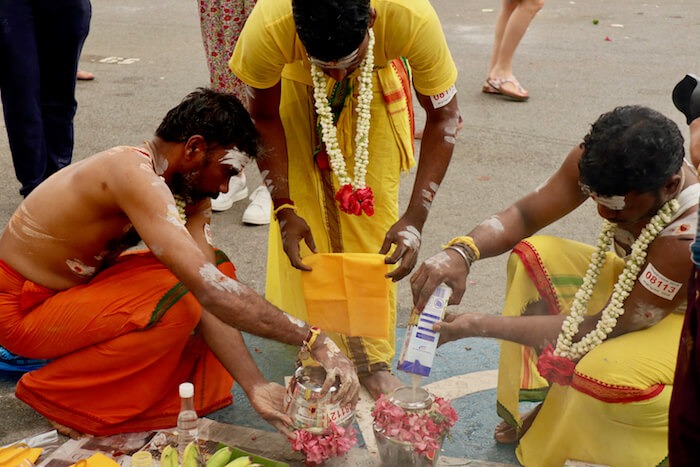
Women and men carry milk pots (palkuddan) on their heads as an offering to Lord Murugan. We didn’t see any women carrying kavadi, though we saw some with their tongues and cheeks pierced. Some people just walk the route. Most were barefoot. Others walked the route in sandals with a bed of nails.
Sri Lanka has Temples. Check our experience of Poya Day at the Anuradhapira Ruins in Sri Lanka.
Preparing for Thaipusam Singapore
Preparation for Singapore Thaispusam begins 48 days before the ceremony. Devotees that plan to carry a kavadi must purify themselves physically and spiritually by praying continuously, fasting or eating only once a day (vegetarian meals) and abstaining from sex. They also fast for 24 hours the day before Thaipusam.
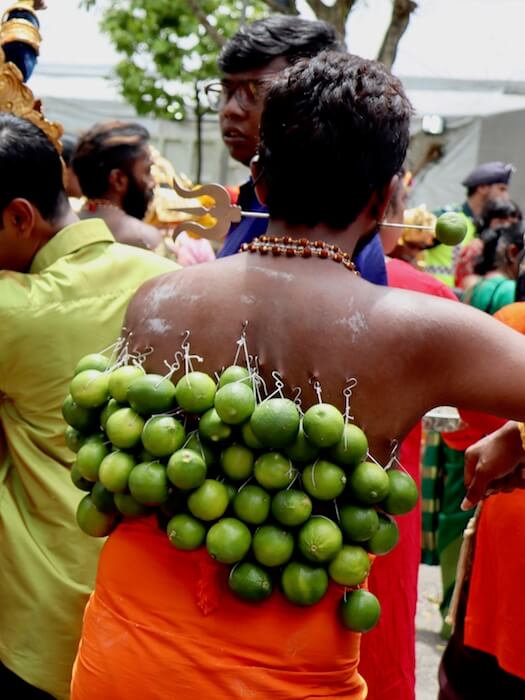
The Night Before Thaipusam
The night before Singapore Thaipusam, Lord Murugan leaves the Thendayuthapani Temple on a chariot to go to Layan Sri Vinayagar Temple (devoted to his brother Sri Vinayagar). In the evening, Lord Murugan returns to Thendayuthapani Temple.
After prayers and just past midnight, the first groups with milk pots leave for Thendayuthapani Temple. At that time, the first Kevadi bearers begin preparation.
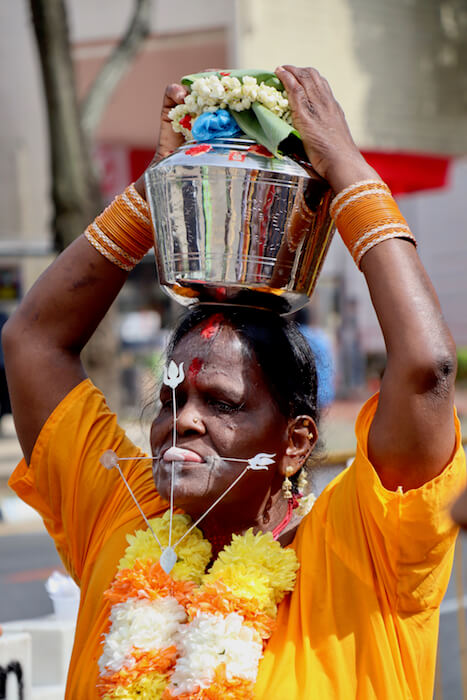
Carrying Kavadi and Piercings
There are many reasons that devotees decide to carry a kavadi. Some do it to keep a vow, others to ask for forgiveness or to offer thanks. It is a deeply spiritual decision.
The kavadis can be simple or very elaborate. Some kavadis are short wooden poles with an arch with Lord Murugan and other deities attached and a small pot of milk on each end. The larger kavadis are attached to the devotees’ body with chains and hooks. They can be several meters tall.
Interested in seeing more Hindu and Buddhist Temples in Southeast Asia? Read the Best Yogyakarta Itinerary Borobudur Tour.
Kavadis can involve a hundred piercings or just a few. The piercings and hooks represent a physical burden through which the devotees ask Lord Murugan for help.
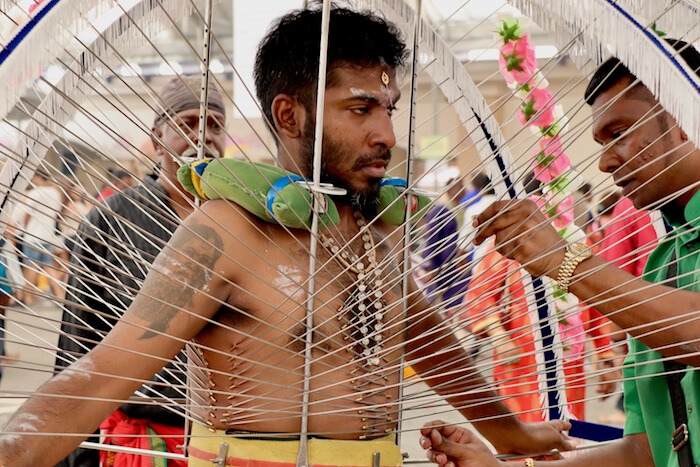
We watch many of the men preparing to carry the kavadi. They began by praying and giving offerings. Then the first part of the kavadi was put on. Some of the men appeared very peaceful and prayed throughout the process. The praying is supposed to put them into a trance so they do not feel pain. Some seemed to experience pain, others not. We also did not see much bleeding with any of the piercings. The tongue piercings were hard to watch. We were told by many people that it doesn’t hurt.
The Procession: Little India to Sri Thendayuthapani Temple
We walked the 4.5 KM route. Some kavadi bearers seemed to have no problem with the route, while others struggled some. It was a hot day and by the end, all of the kavadi bearers were clearly drained. Their teams fanned them and gave them water to help them through the last steps to the Temple.
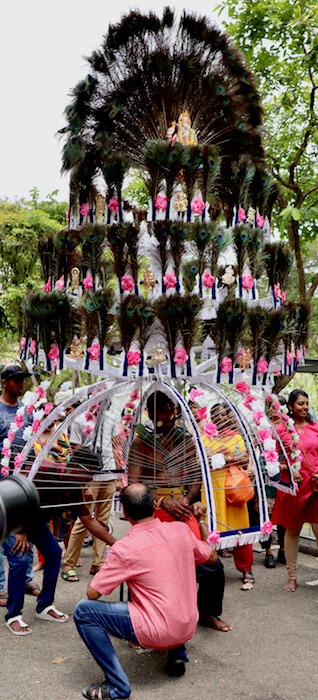
At the end, we accidentally were caught up in the crowd going into Sri Thendayuthapani Temple. There was no way for us to get out of the crowd, so we walked towards the Temple. Before entering the Temple, we had to take off our shoes. Most of the devotees walked the route barefoot whether they carried Milk Pots, Kavadi or accompanied others, We were given bags for our shoes. The Temple was crowded and noisy and exciting. Milk, from all of the offerings, was being poured on Lord Murugan. People were cheering and chanting as the Kavadi bearers arrived.
Kavadis and milk bearers were continually entering. Once they entered, Temple, they twirled and shouted and chanted as they passed by Lord Murugan.
Then they went to an area to have the kavadi taken off and the piercings removed. They were clearly exhausted, and it was time for us to leave.
Going to Singapore Thaispusam
In 2020 Thaipusam will be on Feb 8th.
The procession of kavadi bearers begins at the Sri Srinivasa Perumal Temple at 397 Serangoon Road and ends at the Sri Thendayuthapani Temple at 15 Tank Road. The entire route measures 4.5 km.
You can watch the preparations at Sri Srinivasa Perumal Temple. It is a scene with a lot of tourists taking pictures. We arrived around 10 am when it was less crowded.
Where to See Thaipusam
We recommend that you see Hindu Thaipusam Singapore sometime during your travels. It takes place in cities that have a large Tamil Hindi populations– India, Sri Lanka, Indonesia, Singapore and many other places.
In Southeast Asia, one the largest ceremonies take place in Kuala Lumpur at the Batu Caves. That ceremony reportedly draws 1 million people, so you have to be prepared for the crowds and get there very early.
In Penang, the Thaipusam is smaller. It starts at Kovil Veedu (House Temple) in the centre of Georgetown, and terminates at Nattukkottai Chettiar Temple on Waterfall Road, 6km away.
Unless you love huge crowds, we recommend Thaispusam in a smaller city like Singapore or Penang.
In Singapore, you can observe the festivities the night before. You can go early in the morning as the procession starts in the middle of the night. We opted to go at 10 am to avoid the crowds on the route and at Sri Srinivasa Perumal Temple. Best way to get to Sri Srinivasa Perumal Temple is to take the MRT to Farrer Park station where the temple is just a few steps away.
The last kavadi is required to leave Sri Srinivasa Perumal Temple by 5 pm and arrive at Thendayuthapani Temple by 11 pm.
Have you been to Thaipusam? Another Hindu Ceremony? Leave a Comment about Thaipusam. Do you want to see it?
Please Pin and Share
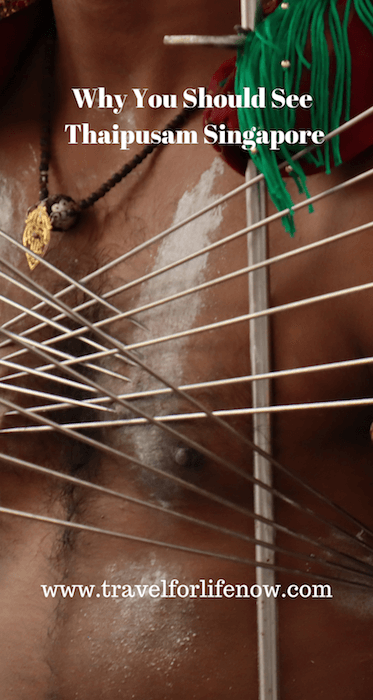
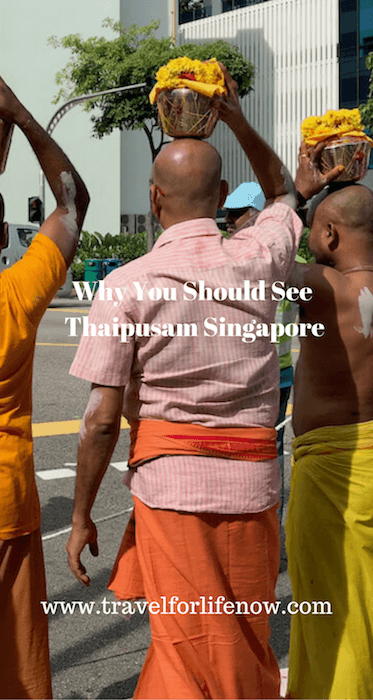
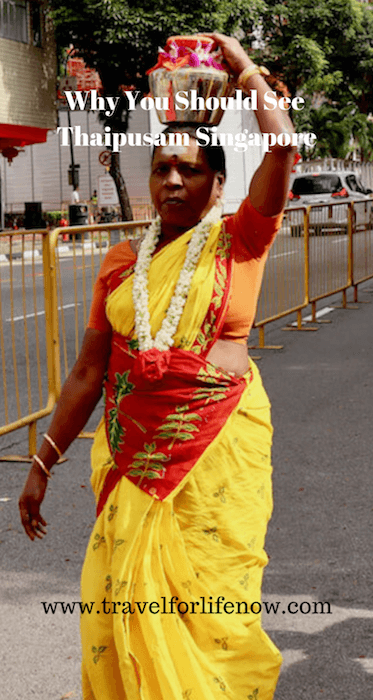

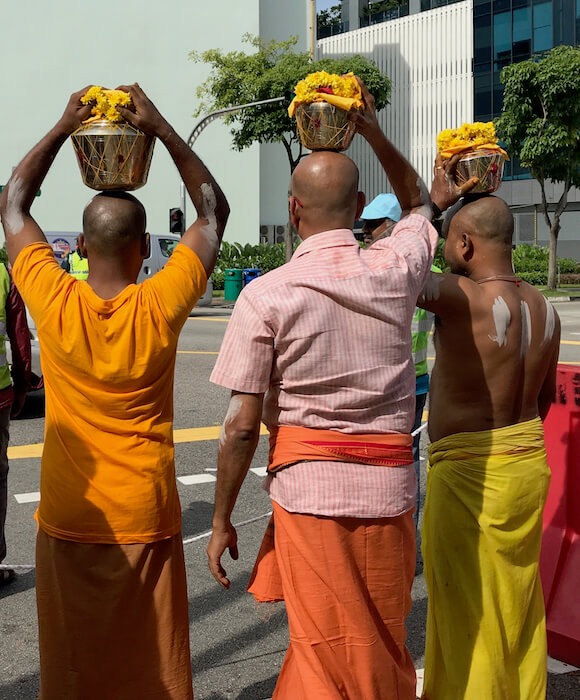
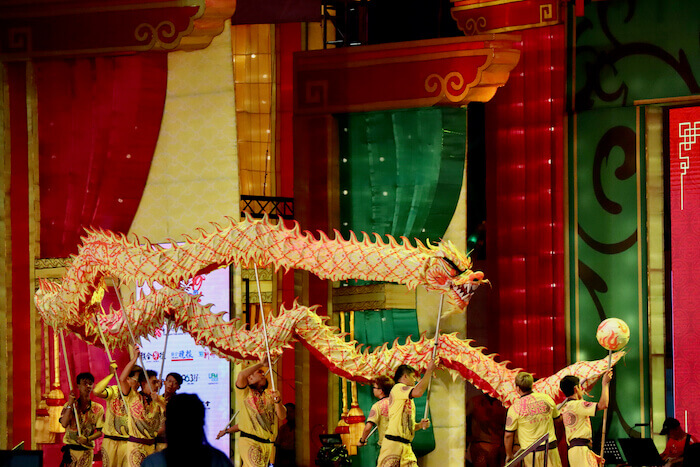
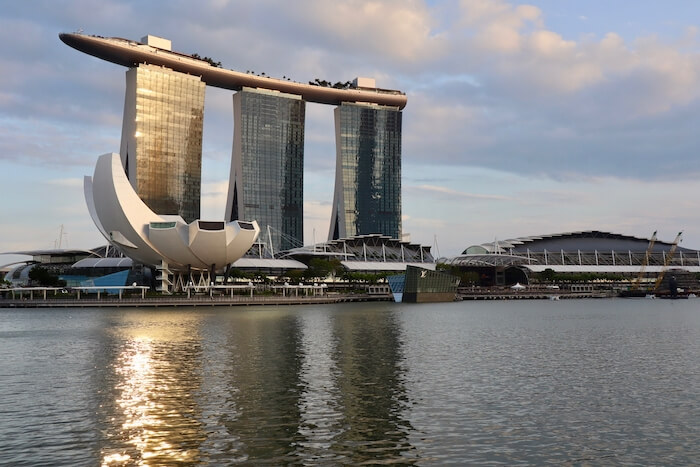
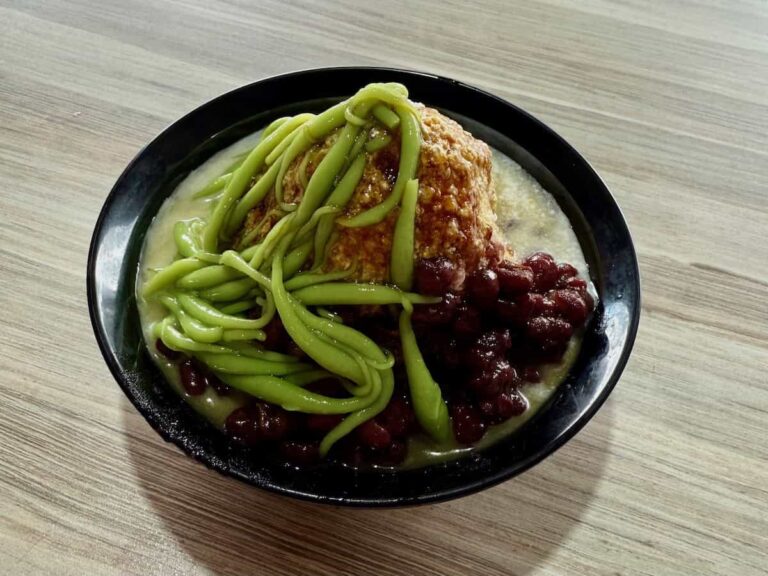
This is so interesting. I had never heard of Thaipusam until reading your blog post. It’s so fascinating! But somehow I feel stressed looking at all the piercings – tounge, cheek, lemon hanger, needles …
Thanks for sharing!
Jyoti-Thanks for reading and commenting. Thaipusam is really interesting. The Piercings are hard to see. It really helped me to see how the people doing it appeared in person.
Thank you so much for sharing. I try never to judge other beliefs and cultures and am so glad you shared this. I had never even heard of this ritual and admire individuals with so much devotion to their faith.
Kelly-Thanks. It was very much a privilege to be able to see this.
Wow! What an enlightening post. Hinduism takes many forms of worship across India and the world. I’ve been in Tamil before but I have never seen this festival. Definitely a different side of Singapore. I love the religious diversity there and it’s so important to remember and remain open minded. Thanks for sharing Sophie x
Sophie-Thanks. I like learning more about the Hindu religion
Wow – interesting! I hadn’t heard of this ceremony & grimaced when I saw some of the photos but its really enlightening to read so thanks for sharing. As travellers, I believe its so important for us to be open-minded & respect others belief systems. Fascinating!
Sue-Thanks for commenting. The piercings are a big part of the ceremony, but seeing it in person, I gained a deeper understanding about it and it changed how I thought about them. I like when a travel experience changes how you see something.
Hi Sue, it is October 2019 and I have just come across your really informative article. Briefly, Dad was based at RAF Tengah in the late 1960’s and he took loads of Agfa slides of Thaupusam.Sadly all of these slides were lost in the intervening years. My plan is to do a family pilgrimage and as part of that, re- photograph the various stages of the procession. One of the things he did was to get up in the dead of night and take a taxi ( no MRT in those days) and take images of the devotees being prepped and then, at the other end, their limes, prongs and hooks being removed. I’m not sure these days if tourists would be given such access?
I’d be so grateful for your hints and tips on where and at what time to go. Is there any way of PM-ing you for further info?
Thank you again for your really helpful article.
Kind regards
Kerry Hutchinson
Kerry,
Lovely to hear about your father. It does start the night before and you can go just before midnight. The first preparations start before midnight and processions start just after midnight. The daytime processions continue through the night and you can go into the first temple to take photos. We can discuss this more over email: [email protected].
Sue
This such an interesting event! I have to admit the piercings had me cringing a little bit, but again, since I see everything from outside I can only say that I do not understand it. Thank you for sharing with us!
jenn-Thanks for reading. It made me cringe too, but as I watched, I understood more about it.
How fascinating. My husband was originally raised as Hindu and was born in Singapore, so I had to go ask him about this event. It’s interesting too that there are some groups of people who pierce and hang themselves from hooks and such in the U.S. with no religious affiliation and I wonder if it stemmed from this ceremony. I always think it is worth respectfully experience and learning about various cultures, so I am glad you went and wrote about it.
Thanks Susanna. I was trying to be respectful and also to have the experience impact on me. And, others, through my writing about it.
To me Singapore is just a hi-tech city with perfect roads and infrastructure and a man-made beauty. Such ancient festivals performed with such pomp in Singapore is a revelation for me. Great to learn this new aspect of multi-culturism in Singapore. Makes me want to visit the place more.
Sinjana-Thanks. Singapore’s multicultural side is not often covered. There is so much here beyond Crazy Rich Asians and Marina Bay Sands.
Wow! What a fascinating peek into local culture and tradition! I think I might be squeamish to watch the piercings; I’m wincing just looking at some of the photos. Very cool experience, thanks for sharing!
Leigh-Thanks. It made us grimace too, but then seeing it actually be done changed how I thought about it.
As a Hindu from India, I always find it fascinating to see how it is practised in other parts of the world. I have been to Srinivasa Temple but wasn’t there for the festival, nor was I aware of it. I found your article enlightening and thought provoking in the sense that how Hinduism is practised in so many different ways around various communities.
Arunima-Thank you for your comments. I am glad that the post was enlightening. I wanted to make sure I was sharing the festival in a respectful way, not as a voyeur.
I have never heard of Thaipusam before. Thanks a lot for sharing your extraordinary experience and bringing me with you there.
Totally agree! I saw this festival in Singapore too and it was incredible to witness.
Aimee-Thanks. How long ago did you see it?
I saw a program on Discovery channel 2 years ago and to be honest it made me anxious & nervous seeing all these piercing.
It’s a matter of faith and trust for devotees. I am sure it is a different experience seeing everything in real.
Sapna, Thanks for your comment. What came through to me in person was devotion and teamwork. I can see how it would look different on TV.
This looks like an amazing festival to watch over in Singapore. Thanks for sharing!!